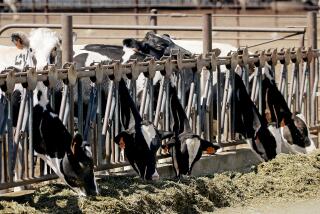Cheese Makers Face Antitrust Allegations
A federal appeals court has ruled that Philip Morris Cos.’ Kraft Foods and several other cheese makers must face allegations that they illegally conspired to drive down milk prices paid to California farmers.
An antitrust suit filed by milk producers in 1998 had been dismissed when a judge ruled in part that the case didn’t meet antitrust standards because it didn’t show harm to consumers in the form of higher prices.
The 9th U.S. Circuit Court of Appeals reversed the dismissal, saying the producers are entitled to press their claims even if consumer prices weren’t affected, in order to preserve industry competition.
Hanford, Calif.-based Knevelbaard Dairies and other dairy farmers accuse Kraft Foods, Land O’Lakes Inc.’s Alpine Lace Brands unit and Borden Inc. of rigging the prices they paid for milk through a now-defunct auction agency called the National Cheese Exchange.
By dumping low-priced cheese on the market, they say, Kraft and others were able to drive down the price of cheese and ultimately their procurement price for milk by millions of dollars because California’s minimum farm price for milk was in part based on those transactions.
The Wisconsin-based National Cheese Exchange was discontinued in 1997. Minimum milk prices in California, as dictated by the California Department of Food and Agriculture, are now determined with a formula based on Chicago Mercantile Exchange cheese prices.
“It got to a point in the 1990s where only a small fraction of the cheese sold in the country was sold through that auction agency, “ said Michael Bidart, a Claremont-based attorney representing Knevelbaard. “Yet that tiny cash auction was setting milk and cheese prices across the country.”
Indeed, Bidart said, in the year preceding its close, only about eight entities were selling on the exchange, including the three named in the suit.
Kraft officials declined to comment on the suit, and Land O’Lakes and Borden officials could not be reached for comment.
However, a spokeswoman for the Dairy Institute of California, a trade group representing cheese makers and milk processors, insisted the low prices are simply indicative of the growing supply of milk.
“Price fixing is often alleged when market prices are extremely low and troublesome to farmers,” said Rachel Kaldor, executive director of Sacramento-based Dairy Institute. “[These companies] are bidding based on competition and supply, not to drive producer prices down.”
More to Read
Inside the business of entertainment
The Wide Shot brings you news, analysis and insights on everything from streaming wars to production — and what it all means for the future.
You may occasionally receive promotional content from the Los Angeles Times.










